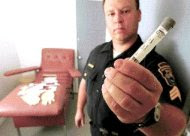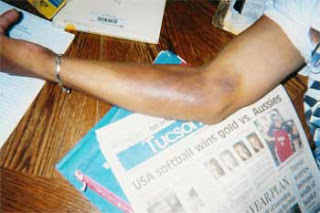Bloodsuckers In Blue
 To “Protect” and Siphon: A “Phleboto-Cop” prepares to drain the blood of a “volunteer.”
To “Protect” and Siphon: A “Phleboto-Cop” prepares to drain the blood of a “volunteer.”
(Thanks to Freedom’s Phoenix)
During the mid-1980s, a state radio broadcast in East Germany proudly announced a record-breaking national blood drive. In the audio equivalent of fine print could be found the critical, defining detail: “Most of the donors were volunteers.”
As with so many other East German episodes of that sort, the Stasi State’s practice of compelled blood donation prefigured current developments here in the erstwhile Land of the Free.
An appeals court in New Jersey has ruled that police enjoy “qualified immunity” when accused of excessive force in retraining a man from whom they’re extracting an involuntary blood sample.
That decision is veritable layer cake of due process atrocities.
The foundation is the well-established, and constitutionally spurious, concept of “qualified immunity,” the incantation regularly pronounced to protect law enforcement officers from civil liability when they needlessly or improperly injure or kill innocent people.
Offenses against the Bill of Rights – particularly the Fourth Amendment prohibition of unreasonable searches and seizures, and the Fifth Amendment’s protection against self-incrimination – compose the middle layer.
Topping off the court’s unpalatable confection is the claim that it is proper for a police officer to force a subject to submit to those violations of his constitutionally protected rights through abuse tantamount to torture. In this case, a police officer placed his entire bodyweight on one of Russell Johnson’s wrists while attempting to handcuff him.
According to Dr. Michael S. Grenis, an orthopedic physician who examined Mr. Johnson, the predictable result of the policeman’s action was not only to inflict excruciating pain, but also leave him with permanent nerve damage that may result in “permanent impairment of a significant body function.”
That last line, incidentally, wasn’t extracted from the New Jersey court decision, or the physician’s report. It was taken from the notorious 2002 “Bybee Memorandum” in which the Bush Regime defined torture as narrowly as it could, for the purpose of enabling that practice as much as it could. This adds another dreadful weapon to the arsenal of the armed parasites called “DUI officers.”
Quite in spite of themselves, DUI officers occasionally identify and remove from the highways people whose state of intoxication make them dangerous to innocent people. In like manner, the police in East Germany did occasionally identify and arrest people who had committed real crimes against persons and property. By this was incidental to the primary purpose of East Germany’s police, which was to compel the submission of that nation’s captive population.
In much the same fashion, arresting real drunks is peripheral to the prime directive of DUI police, which is to harvest revenue for the jurisdictions they serve. And it’s hardly necessary for a driver to be intoxicated – or even to drink at all – to be caught in the clutches of the DUI enforcement system. As California DUI attorney Lawrence Taylor observes, there is a widely observed “DUI exception to the Constitution,” and that “exception” is doing a great deal to make East German-style police behavior the norm.
The October 1 installment of the investigative TV program Inside Edition examined the recent DUI arrests of two men – one of them a Polk County Commissioner named Randy Wilkinson, the other an 19-year-old named Robbie Stout – neither of whom had consumed so much as a picogram of alcohol on the day of the arrest. Both Wilkinson and Stout were handcuffed, fingerprinted, forced to pose for mug-shots, and briefly jailed.
What was particularly galling in the case of Randy Wilkinson was that he requested a blood alcohol test, which confirmed that there was no alcohol in his bloodstream – yet the charges weren’t dropped until much later. Likewise, Stout underwent a blood alcohol test (apparently not at his request) that produced a negative result – which was also ignored.
On exiting the jail, Wilkinson, who was running for re-election, was greeted by reporters. He was able to get the charges dismissed with relatively little difficulty, but some substantial expense. Stout, a young man of limited means, had to pay several thousand dollars in legal fees in order to clear his name of the bogus charge.
With relatively little difficulty, Inside Edition was able to unearth documentation that DUI officers in Lakeland, Florida — where those spurious arrests occurred — are under a strict quota (clothed in the euphemism “Performance Standard”) to make 10 arrests a month. The program’s investigative team was able to verify that similar quotas have been assigned to police departments across the nation.
Thanks to a pernicious proviso in nearly every driver’s license application called “Implied Consent,” the police can detain any driver at their discretion, conduct a warrantless search of the driver’s vehicle, and compel the driver to undergo a “chemical test” for alcohol, via either the admittedly unreliable instrument called a Breathalyzer, or the more invasive method of a bodily fluid test – blood or urine.
Refusal to submit to this procedure will generally lead to summary arrest for “per se intoxication”; furthermore, as one legal advice website points out, “Under implied consent laws, in most states a driver’s license is automatically suspended for up to one year, even if the motorist is not found guilty of DUI.”
So, in the East German sense of the expression, those of us who have driver’s licenses have “volunteered” to be stopped, interrogated, searched, and surrender bodily samples at the whim of a DUI enforcement officer. And as the cases of Randy Wilkinson and Robbie Stout illustrate, a perfectly clean blood alcohol test will not result in immediate exoneration.
This is because, once again, the purpose of this exercise is not to identify drivers who are dangerously intoxicated, but rather to generate revenue. Former Atlanta DUI Officer Tony Corrado admitted to Inside Edition that filling DUI arrest quotas is necessary in order to keep federal subsidies flowing into “local” police departments.
Matters get worse – they always get worse – at DUI “safety checkpoints.”
One return on Washington’s investment in subsidizing DUI arrests is a healthy stream of vital information collected by police at “safety checkpoints.” A May 2, 2005 Washington Post story describes how the hundreds of Washington-area motorists pulled over at “safety checkpoints” were aware that they were being subjected to an involuntary intelligence-gathering dragnet.
One of the innocent people profiled by the Post story, Lisa Davis, was sober and carefully obeying all traffic laws when she was detained at a checkpoint. “Even so,” noted the Post, “an officer jotted down some basic information before letting her go, including her name, address and the time and location of the stop for a police database….”(Emphasis added.)
Which is to say that she – like all the other drivers who passed through the checkpoint – was temporarily arrested (that’s the correct term to use when a police officer detains you, however briefly and for whatever purpose) and compelled to surrender personal information at gunpoint.
And just as all drains eventually flow into the ocean, all information collected by “local” police eventually ends up in Leviathan’s master databases, to be used as Leviathan’s masters see fit – a reality somewhat understood by Miss Davis, if by relatively few others.
“I’ve got some serious constitutional issues with that,” commented Miss Davis about the police search. “I feel like it’s a violation of my rights. It’s a slippery slope to Big Brother.”
I disagree with Miss Davis only to this extent: She fears the impending advent of a Big Brother State, rather than recognizing that it has already descended on us. How else can we adequately describe a system in which police can compel innocent people to suffer the invasion of their persons for blood tests – and when a negative result does not provide immediate exoneration?
To “Protect” — and Infect: James Green, victim of a police-administered DUI blood draw, displays the infection he received as a result.
A few years ago, Arizona became the first state to train police officers to collect their own blood samples. This procedure is now used in Utah, Texas, and perhaps elsewhere. Although they are trained to render emergency aid, Police are not health care professionals – as Arizona resident James Green learned, to his dismay, when he was arrested on suspicion of DUI by a Pinal County Sheriff’s Deputy.
Despite the fact that the arrest took place within walking distance of a hospital, the deputy insisted on performing the blood draw. Two inept and unhygenic needle-sticks later, the deputy has his blood sample – and Green had a nasty infection that lasted for months and forced him to miss work as a test pilot.
Da Boyz in Blue Had Their Fun: Brian Sewell displays injuries sustained in a Taser attack inflicted on him when he refused to let Sheriff’s Deputies draw his blood.
Green was more fortunate than Brian Sewell, another Arizona resident who was arrested for DUI in 2004 and forced to undergo a blood draw. Like many others, Sewell is deathly afraid of needles, and didn’t consent to be stuck. He received three Taser shocks while resisting efforts by deputies to draw his blood. Eventually the charges against Sewell were dropped.
Given that blood test evidence isn’t considered conclusive (at least for purposes of exculpating the accused), what is the purpose of such behavior by the police?
We should never rule out simple sadism.
“Blood draws allow the police to take out a little bit of `street justice’ on suspects who refuse to cooperate by sticking a needle in them,” opined a defense attorney in commenting about an essay by the above-mentioned Lawrence Taylor. “If an officer is angry with the suspect, he may present an unreasonable risk of harm to the suspect. Also, the officer is less likely to establish phlebotomy safety protocols. I have a client who was stabbed with a needle 5 times by a police officer before they took him to the hospital to get a blood draw. The client told the police that he had collapsed veins and they would not be able to get his blood. The police did not listen because there had been a scuffle and they were angry with my client. My client took pictures of the puncture wounds the next day. We have a hearing on the matter in December.”
We shouldn’t be surprised when we learn that the officers in that incident “behaved professionally” and “acted within department guidelines.” The outcome of official inquiries into police misconduct is usually as predictable as an East German election.
___________
A friend in the health care field corrected my improper use, in the original version of this essay, of the term “dysgenic” to refer to a non-sterile needle stick. Thanks, Bud!
Dum spiro, pugno!
Content retrieved from: http://freedominourtime.blogspot.com/2007/10/bloodsuckers-in-blue.html.





























